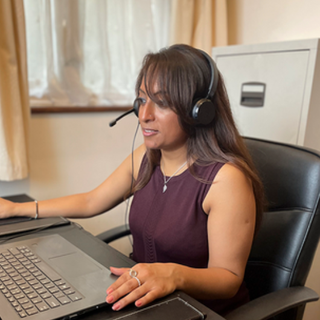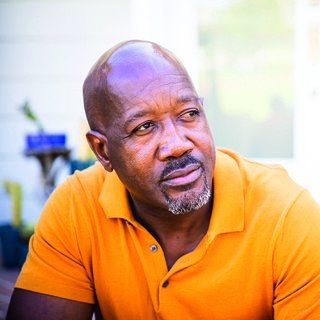Advocating for myself with chronic blood cancer
Paul has been living with chronic myeloid leukaemia (CML) since 2013. He shares his advice on how to advocate for yourself with your medical team.

I’ve been living with a chronic type of blood cancer for over a decade. Looking back, I realise how important it is to be able to communicate with your medical team and to feel confident in challenging them if needed. But that wasn’t always easy, and it’s something I’ve learned to do over time.
When I was diagnosed with CML in 2013, it was very hard to take in what I was being told in my first few appointments. I felt bombarded with information, I didn’t know the terminology, I didn’t know what questions to ask. To be honest, I think my brain shut down at the word “cancer”.
I wish I’d had someone with me for all of the earlier appointments, even just to take notes. They could have helped to ask questions when I felt too overwhelmed, and made sure nothing was missed.
The other thing I wish I’d done, was to have a notebook to hand, so I could note things down if any questions or worries popped into my head in between appointments. It’s easy to forget what you wanted to ask when talking to your doctor, so having my thoughts and questions written down would have helped.
Learning to advocate for myself
Before the CML diagnosis, I’d never really had to advocate for myself when it comes to healthcare. I’d had a few experiences of hospital treatment, but I just trusted in the doctor’s expertise and put myself in their hands.
But early on in my treatment for CML, I had some bad experiences with the hospital losing my blood results. I also had a healthcare professional who was very dismissive when I raised concerns about side effects from my treatment.
Those experiences taught me that it’s not only okay to challenge, but sometimes it’s absolutely necessary. Eventually, I moved my care to a different hospital, and I’ve never regretted it. That change gave me more confidence to be an active participant in my own care.
Over the years, I’ve become an expert in CML. That might sound arrogant, but it’s down to 12 years of lived experience.
I know the patterns of my side effects, and I can tell my doctors what’s normal for me and what’s new. That confidence didn’t come overnight – it came with time, experience, and arming myself with the right information.
One of the biggest turning points for me was connecting with others who also had CML. At first, I was reluctant to seek any support after my diagnosis. But my wife saw an advert for an event hosted by Blood Cancer UK and encouraged me to attend. At that event, I was overwhelmed. For the first time, I was surrounded by other people affected by blood cancer, and I realised I wasn’t alone.
Talking to other people with CML – through Blood Cancer UK, online communities and Facebook – has played a big part in giving me the confidence to speak up for myself with my medical team.
Other people with CML shared their experiences of treatment, side effects, and the emotional ups and downs. Talking to them gave me both reassurance and practical advice. Sometimes just hearing “yes, that happened to me too” was enough to calm my anxiety, or give me the validation I needed to go back to my medical team and push for help.
If you’ve just been diagnosed, I know how overwhelming it feels. You might not be ready to think about advocating for yourself right now – and that’s okay. But as you go through your journey with blood cancer treatment, here are some things I’ve learned that might help:
Communicating with your medical team
- Take someone with you to appointments – a family member or friend can write notes, ask questions, and help you remember what was said.
- Keep a notebook or app or recording device handy – jot down questions or symptoms as they come up, even in the middle of the night, so you don’t forget by the time of your next appointment.
- Ask for explanations, not just reassurance – if a doctor says “don’t worry,” it’s okay to ask them to explain why you shouldn’t worry, with facts and reasoning.
- Don’t be afraid to ask the same question again – the shock of hearing “cancer” can shut down your ability to take in information, so repeating or clarifying is completely normal.
- Speak up if something feels wrong – whether it’s side effects, lost test results, or dismissive answers, you have the right to raise concerns and ask for better communication.
Advocating for yourself
- Keep a record of your care – note dates, symptoms, treatments, and any issues (e.g. missing blood results). This gives you evidence if you need to escalate or request a referral
- Know that you can change hospitals or doctors – if you’re unhappy with your care, you can ask your GP for a referral elsewhere.
- Trust your lived experience – healthcare professionals have expertise in treating blood cancer, but you are the expert in your own body and how it feels.
- Ask questions until you’re satisfied – you won’t get into trouble for questioning your medical team. If you’re not happy with the answers, seek second opinions or ask patient charities like Blood Cancer UK for guidance.
- Connect with others who’ve been there – support groups (online or face-to-face) can help you check if what you’re experiencing is “normal” and give you confidence to challenge your medical team if your concerns are being dismissed.
If you’d like to boost your confidence in talking to your medical team, contact our Support Service. We help lots of people prepare for their medical appointments, so please do get in touch on 0808 2080 888 or email the team.
You can also talk to other people who’ve been diagnosed blood cancer, and who can give you the benefit of their experience, on our online community forum.



